Essential Tips for Conducting Background Searches

Understanding Background Searches
A background search is a process used to verify an individual’s history and gather information about their personal, professional, financial, and criminal background. This search is typically carried out by businesses, landlords, educational institutions, and individuals to assess the reliability, integrity, and qualifications of a person. Whether it’s for employment, tenancy, or a security clearance, background searches play a crucial role in ensuring trust and safety in various contexts.
In this section, we will delve deeper into the concept of background searches, the types of searches commonly performed, their purposes, and the benefits they provide to both employers and individuals.
What is a Background Search?
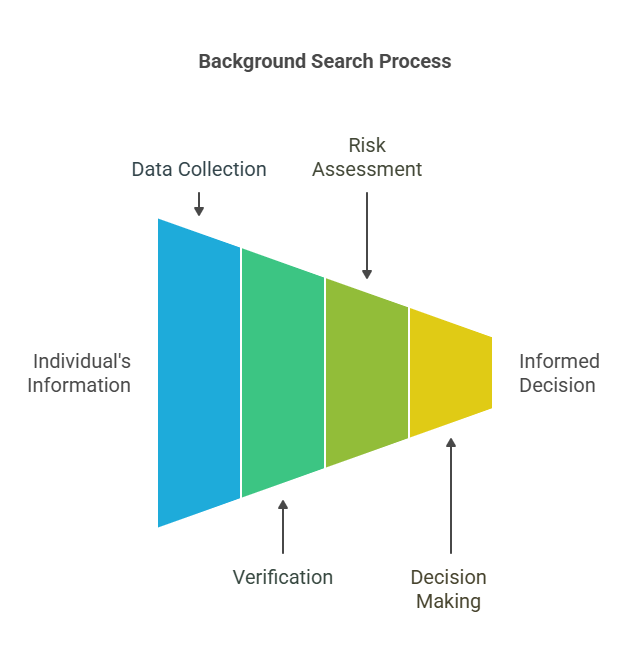
A background search refers to the investigation of an individual’s personal and professional history. The primary purpose of this search is to verify the accuracy of the information provided by the individual and to ensure that they do not pose a risk in the context they are being evaluated for, whether that is for employment, tenancy, or a security clearance.
Employers, landlords, schools, and even government agencies perform background checks to assess an individual’s history and qualifications. These checks help in identifying any potential red flags or areas of concern, such as criminal records, inconsistent work history, or financial issues. A thorough background search not only provides insight into a person’s past but also helps in making informed decisions for hiring, renting property, or assigning responsibilities.
Types of Background Searches
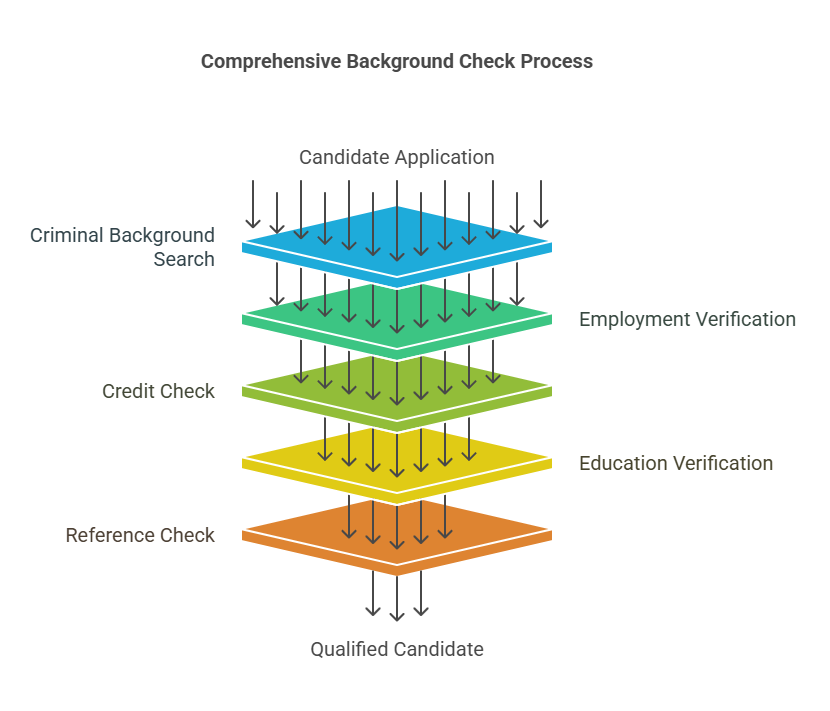
There are several types of background searches, each focusing on a specific area of an individual’s history. Let’s explore the most common types:
1. Criminal Background Search
A criminal background search is one of the most common types of checks. It involves examining an individual’s criminal record to determine whether they have been convicted of any crimes. This search is typically carried out through local, state, and federal criminal databases to ensure that the person does not pose a risk in roles that require trust and safety, such as working with children, elderly individuals, or in sensitive positions.
Criminal background searches are important for employers, especially in industries like healthcare, education, and finance, where trust is paramount. Landlords may also request criminal background checks to ensure that potential tenants have a clean record and are unlikely to pose a threat to other residents.
2. Employment History Verification
An employment history verification check is performed to verify the accuracy of the work experience that an individual has provided in their job application or resume. This check is crucial for employers looking to assess a candidate’s job stability and qualifications. It involves contacting previous employers to verify the dates of employment, job titles, and the individual’s performance.
Employers use this search to confirm that the candidate has the necessary experience for the job and to ensure that they have been truthful about their work history. It also helps to identify any potential discrepancies or gaps in employment that could raise questions about the individual’s reliability or professionalism.
3. Credit Check
A credit check reviews an individual’s financial history, including outstanding debts, payment history, and credit score. This search is typically carried out for positions that involve handling finances or sensitive financial data. Employers may use a credit check to assess a candidate’s financial responsibility and determine whether they are at risk of financial problems that could impact their job performance or integrity.
Credit checks can also be useful in certain industries such as banking, finance, and insurance, where employees are entrusted with managing client funds or handling financial transactions. While credit checks are not used as frequently as criminal background searches, they are still an important tool in evaluating candidates for specific roles.
4. Education Verification
An education verification search confirms the educational qualifications that an individual claims to have earned. Employers and educational institutions may use this search to verify the completion of degrees, diplomas, and certifications. This check helps in ensuring that the candidate has the necessary academic background and qualifications for the job or position they are applying for.
In industries where specific certifications or degrees are required, such as in healthcare or engineering, an education verification is essential for confirming a candidate’s eligibility and competency. This search can also help employers avoid hiring candidates who may have falsified their qualifications.
5. Reference Check
A reference check involves contacting the personal and professional references provided by an individual to learn more about their character, work ethic, and interpersonal skills. This check is often used as a complementary search alongside criminal background checks and employment verification to get a holistic view of the candidate.
Employers use reference checks to gauge how well the individual will fit into the work environment and whether they have the necessary soft skills, such as communication, teamwork, and problem-solving abilities. References provide an opportunity for employers to hear firsthand about a candidate’s previous job performance and personal qualities, which may not be evident from the resume or interviews alone.
The Purpose of Background Searches
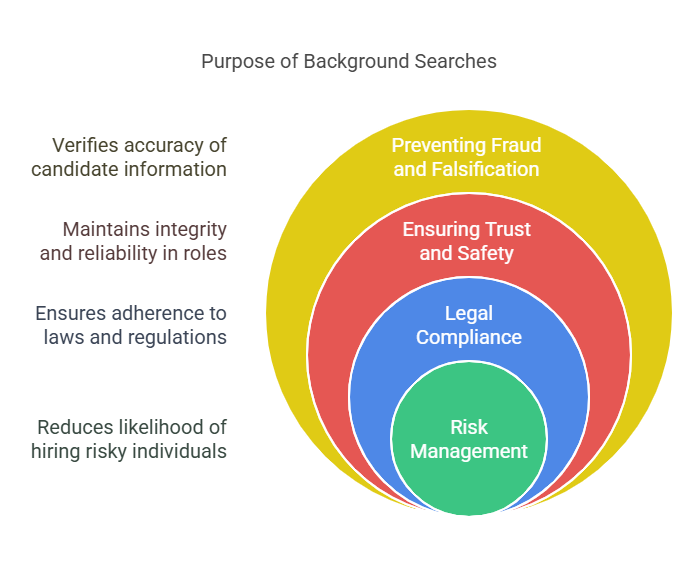
1. Risk Management
One of the primary reasons businesses and organizations conduct background searches is risk management. By thoroughly screening potential employees, landlords, or contractors, organizations can reduce the likelihood of hiring individuals who could pose risks to safety, security, or productivity. Background checks can help identify individuals with criminal records, poor financial histories, or questionable employment practices, which could lead to issues down the line.
Employers in safety-sensitive industries, such as healthcare, transportation, and finance, often require background checks to mitigate the risk of hiring employees who might not be trustworthy or reliable. For instance, hiring someone with a history of substance abuse or violent crime could be dangerous in a role that involves direct interaction with vulnerable populations.
2. Legal Compliance
Certain industries and organizations are required by law to conduct background checks as part of their hiring process. Compliance with regulations, such as those mandated by the Fair Credit Reporting Act (FCRA) and various state laws, helps businesses avoid legal issues and ensure that they are following the proper protocols when assessing candidates. For example, healthcare employers are often required to check a candidate’s criminal background, while financial institutions may need to verify a candidate’s credit history before hiring them for specific roles.
In addition to industry-specific regulations, some jurisdictions require background checks for specific positions, such as those working with children or the elderly. Failure to comply with these legal requirements could result in penalties or lawsuits.
3. Ensuring Trust and Safety
Background searches also help ensure that individuals in positions of trust, such as employees, tenants, or contractors, have the integrity and reliability required for the role. For example, landlords conduct background checks to ensure that prospective tenants have a history of paying rent on time and have not been involved in criminal activities that could disrupt the safety and harmony of the community.
Employers also conduct background searches to ensure that potential employees do not have a history of unethical behavior, such as dishonesty, harassment, or theft, which could damage the company’s reputation and work environment.
4. Preventing Fraud and Falsification
Background searches are essential for verifying the accuracy of the information provided by candidates. It is not uncommon for individuals to exaggerate or falsify their qualifications, employment history, or other aspects of their background in order to appear more qualified for a job or rental property. By performing background checks, employers and landlords can catch these discrepancies before they make an expensive hiring or rental decision.
For example, an applicant who claims to have a degree in a specific field may not actually have completed their studies. This could lead to hiring an unqualified individual for a role that requires specialized knowledge. Background checks help identify these discrepancies and ensure that individuals are not hired or rented to without fully verifying their credentials.
The Benefits of Conducting Background Searches
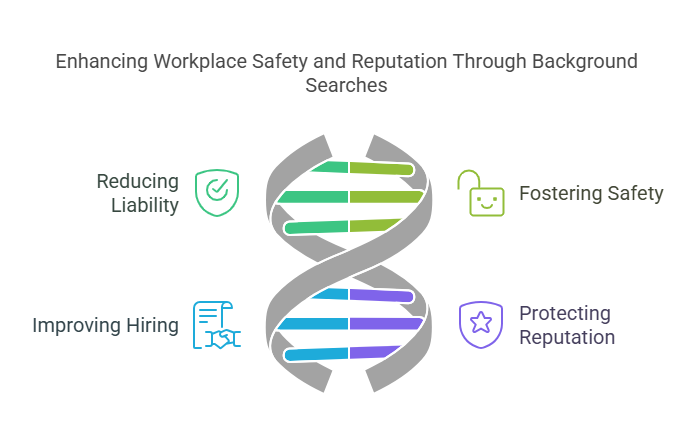
1. Reducing Liability
For employers, conducting thorough background searches is a key strategy for reducing liability. Hiring an employee with a criminal history or a questionable professional background could lead to serious legal consequences, especially if the individual engages in misconduct on the job. Background checks help protect employers from potential lawsuits and claims of negligent hiring.
In addition, background checks help ensure that tenants meet the requirements of the lease agreement, reducing the risk of damage to property or other tenant-related issues. By screening applicants, businesses and landlords can avoid the potential financial and legal costs of hiring or renting to the wrong person.
2. Fostering a Safe Environment
Background checks help foster a safe environment in the workplace or rental property. When businesses or landlords ensure that applicants have been properly vetted, they contribute to a secure and trustworthy atmosphere. This enhances employee morale and helps foster positive tenant relations.
In industries such as healthcare, education, and government, ensuring the safety of clients, students, or the public is of utmost importance. By verifying a candidate’s background, employers and institutions can ensure that they are hiring individuals who will not pose a risk to others.
3. Improving Hiring Decisions
Conducting a background search allows employers to make informed hiring decisions based on objective data rather than solely relying on resumes or interviews. By obtaining reliable information, employers can evaluate a candidate’s history, qualifications, and overall suitability for the position. This reduces the likelihood of making a poor hiring decision that could negatively impact the organization.
4. Protecting the Organization’s Reputation
Hiring the wrong person can damage an organization’s reputation, especially if the individual engages in unethical or illegal behavior. Background checks help protect the company’s reputation by ensuring that only qualified and trustworthy individuals are hired. This is especially critical in industries where public trust and credibility are essential.
How to Conduct a Background Search
Conducting a background search is a vital step in verifying the history of an individual, ensuring that they are qualified, trustworthy, and safe to hire, rent to, or otherwise engage with. Whether you’re an employer evaluating potential employees, a landlord screening tenants, or an individual verifying your own background, the process of conducting a thorough background search involves several steps. In this section, we will explore the process of performing a background search, tools and resources available, the differences between automated and manual searches, and the role of professional services like Exact Background Checks in making the process more efficient and reliable.
Steps to Conduct a Background Search
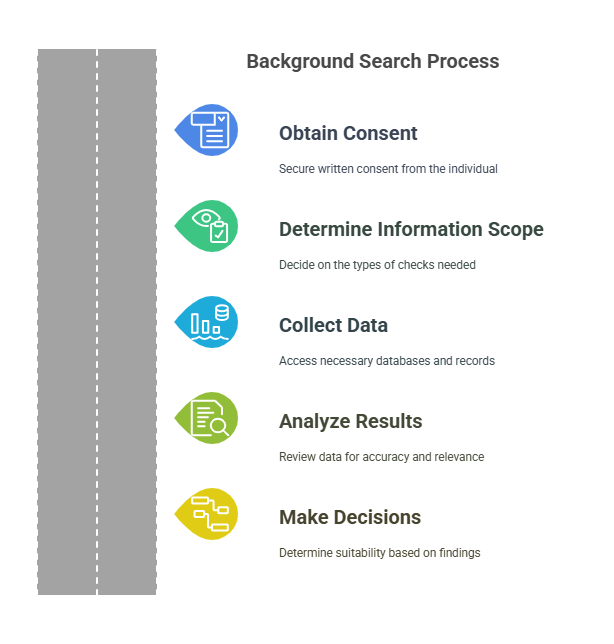
Performing a background search may vary depending on the specific context (employment, tenancy, or security clearance) and the level of detail required. However, the general process remains the same across most types of background searches. Below are the steps involved in conducting a background search.
1. Obtain Consent
Before you begin any background search, it is essential to obtain the consent of the individual being screened. In the case of employment background checks, the Fair Credit Reporting Act (FCRA) mandates that employers obtain written consent before conducting any background check. This consent ensures that the individual is aware that their information will be scrutinized, and it protects their privacy rights.
For tenants, landlords must also seek written consent before initiating a background check. In some jurisdictions, tenant background checks are required by law to include written authorization, which confirms that the prospective tenant understands that their criminal, credit, and rental history will be reviewed.
It is crucial to ensure that the consent is informed, meaning the individual understands the scope of the background check and what types of information will be collected.
2. Determine What Information to Search
Once consent is obtained, you need to decide on the scope of the background search. The scope will vary based on the nature of the position or the purpose of the search. For example:
- Criminal background check: This may include federal, state, and local criminal records, including convictions, arrests, and pending charges.
- Employment verification: Verify job titles, dates of employment, and performance history with past employers.
- Credit history: Evaluate the applicant’s financial responsibility, including outstanding debts, credit score, and payment history.
- Education verification: Confirm the educational qualifications, degrees, and certifications claimed by the individual.
- Reference checks: Contact personal and professional references to assess character, work ethic, and interpersonal skills.
Clarifying the types of background information that you need will allow you to focus your search on the most relevant areas. Different industries may require different levels of scrutiny. For example, financial institutions may emphasize credit checks, while healthcare employers will focus more on criminal background checks.
3. Collect Relevant Data and Access Databases
To perform a thorough background search, you need access to various databases and public records. Many of these records are available online, but accessing certain information may require additional steps or specialized access.
Some common sources of information for background searches include:
- State and federal criminal databases: These databases contain public records of individuals who have been arrested, charged, or convicted of crimes.
- Employment records: These are typically obtained through direct communication with past employers.
- Credit bureaus: These institutions provide access to individuals’ credit history.
- Educational institutions: To verify degrees or certifications, you may need to contact schools or universities directly.
- Public records: Local government databases can provide access to marriage records, divorce records, property ownership history, and other public documents.
The process of gathering this data may involve contacting specific government agencies or private entities that maintain these records.
4. Analyze the Results
After gathering the relevant data, the next step is to analyze the results. This involves reviewing all of the information to ensure that it is accurate and relevant to the purpose of the background search.
For example:
- Criminal background checks: You will need to carefully evaluate whether an individual’s criminal history contains serious offenses that would make them unsuitable for a specific position, such as violent crimes for a role involving vulnerable populations.
- Employment history: Cross-reference the details provided by the candidate with the information gathered through employment verification. If there are discrepancies or red flags, further investigation may be required.
- Credit checks: A person’s credit history should be analyzed for significant issues such as bankruptcies, liens, or missed payments that may impact their suitability for financial positions.
It’s important to keep in mind that the information you collect should be considered in the context of the role or situation. For instance, minor criminal offenses may not be relevant to all positions, while others, like fraud or violence, might be deal-breakers.
5. Decision-Making
Once the background check results are analyzed, you can move forward with decision-making. This step involves determining whether the candidate or tenant meets the necessary criteria based on the information gathered during the search.
For employers, this may mean deciding whether to extend a job offer or consider other candidates. For landlords, it may involve deciding whether to approve or deny a tenant application. It’s important to be fair, transparent, and compliant with the law during this decision-making process.
If there are discrepancies or issues in the background check, it’s recommended to give the individual an opportunity to explain the results, especially if there are mitigating circumstances that could change the interpretation of the information.
Tools and Resources for Conducting a Background Search
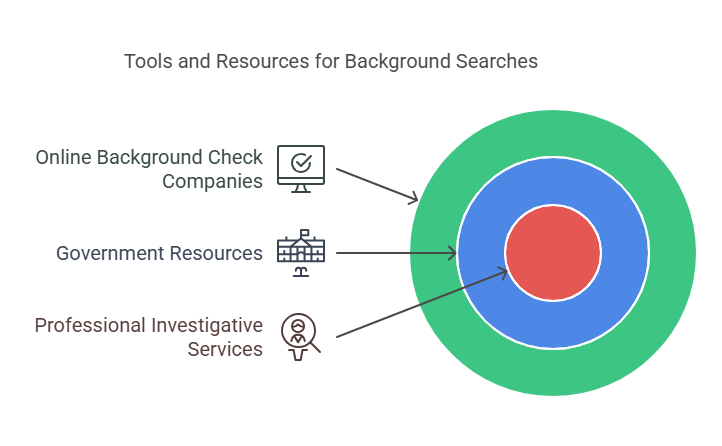
While conducting a background search manually is possible, most individuals and businesses prefer to use various tools and resources to simplify the process, ensure compliance, and obtain accurate results quickly. These tools range from online background check services to government databases and third-party investigative services.
1. Online Background Check Companies
Many businesses and individuals opt to use online background check services to conduct searches more efficiently. These platforms often provide access to databases of criminal records, employment history, and public records. These services can be particularly beneficial for businesses that need to perform background checks on multiple candidates quickly and easily.
Some online platforms provide automated background checks, which deliver results almost instantly, depending on the depth of the search. Services like Exact Background Checks offer a variety of search options, from criminal records to employment verifications, to make the process as streamlined and hassle-free as possible.
Exact Background Checks is a trusted provider that helps businesses and individuals get fast, reliable, and compliant background checks, ensuring that they have the data they need to make informed decisions.
2. Government Resources
Government websites provide access to a wealth of public records, including criminal history, property ownership, marriage and divorce records, and other official documents. While these records are typically public, accessing them may require special permission or processing fees. Federal and state government resources can be accessed directly, but they may not always provide the user-friendly interface or instant access that online background check companies do.
3. Professional Investigative Services
For more in-depth or complex background checks, some businesses or individuals may choose to use professional investigators who specialize in background searches. Investigative services can offer a high level of expertise in tracking down hard-to-find information or handling complex searches that involve international or multi-jurisdictional data. Investigators may also be able to provide insights beyond what automated services can offer.
These services are often more expensive than online platforms but may be necessary for businesses or individuals dealing with high-stakes decisions.
Automated vs. Manual Searches
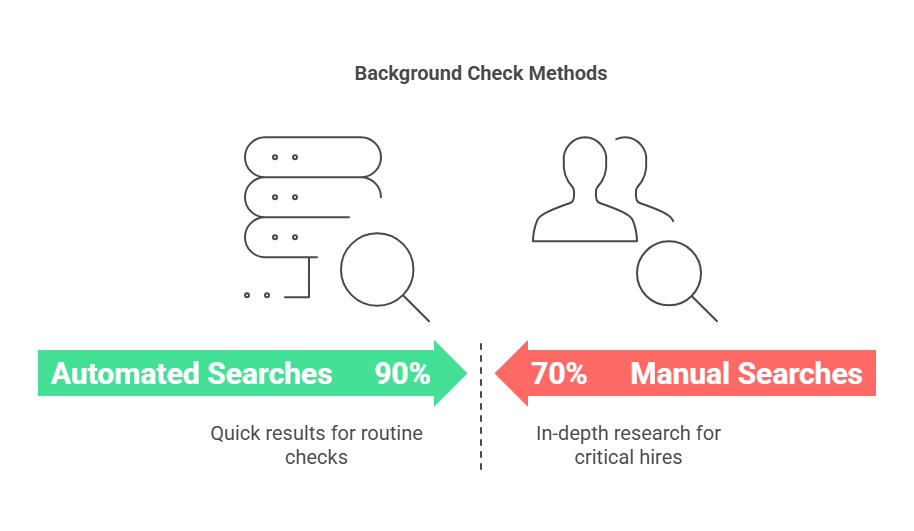
When conducting background checks, there are two primary methods: automated searches and manual searches. Let’s examine the differences between the two.
Automated Searches
Automated background check services use databases and algorithms to pull up records quickly and efficiently. These services are ideal for routine background checks, such as verifying criminal history or employment records. They are generally faster and less expensive than manual searches, making them a popular choice for businesses that need to process many applicants in a short amount of time.
The main advantage of automated searches is speed. Many online services provide instant results for criminal records, credit checks, and employment history. However, automated searches may not capture all of the nuances of an individual’s history, such as recent changes to their criminal record or discrepancies in employment dates.
Manual Searches
Manual background checks, on the other hand, involve in-depth research by an investigator or through direct communication with sources like previous employers or educational institutions. These searches are more thorough and can uncover information that may not appear in automated systems. For example, manual checks might involve interviewing past employers or investigating public records that are not readily available through online databases.
While manual searches are more comprehensive, they tend to take longer and can be more expensive. For critical hires or situations that demand a higher level of scrutiny, a manual search may be the preferred option.
Comparison of Search Types, Costs, and Timelines
Here’s a quick comparison of the types of background searches, including typical costs, timeframes, and the information each search reveals:
| Type of Search | Information Provided | Typical Cost | Typical Timeframe |
|---|---|---|---|
| Criminal Background | Criminal convictions, arrests, and pending charges | $20 – $100+ | Instant to 1-5 days |
| Employment Verification | Job titles, dates of employment, performance, reasons for leaving | $25 – $50 | 1-2 weeks |
| Credit Check | Credit score, payment history, debt, bankruptcies, credit inquiries | $15 – $50 | Instant to 1 day |
| Education Verification | Degrees, certifications, dates of attendance | $30 – $75 | 1-2 weeks |
| Reference Check | Personal and professional references, work ethic, skills | $15 – $50 | 1-2 weeks |



